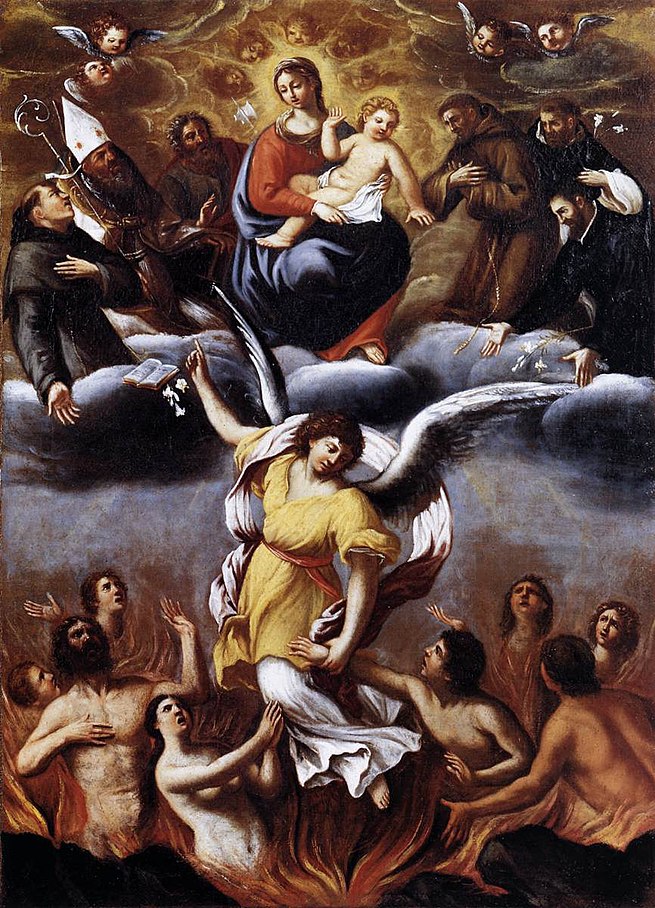-
Purgatory
In Roman Catholic theology, purgatory (Latin: Purgatorium, via Anglo-Norman and Old French) is an intermediate state after physical death in which some of those ultimately destined for heaven must first “undergo purification, so as to achieve the holiness necessary to enter the joy of heaven,” holding that “certain offenses can be forgiven in this age, but certain others in the age to come.” And that entrance into Heaven requires the “remission before God of the temporal punishment due to [venial] sins whose guilt has already been forgiven,” for which indulgences may be given which remove “either part or all of the temporal punishment due to sin,” such as an “unhealthy attachment” to sin. Only those who die in the state of grace but have not yet fulfilled the temporal punishment due to their sin can be in purgatory, and therefore, no one in purgatory will remain forever in that state nor go to hell. The notion of purgatory is associated particularly with the Latin Rite of the Catholic Church (in the Eastern sui juris churches or rites it is a doctrine, though it is not often called “purgatory”, but the “final purification” or the “final theosis”).
Although denying the existence of purgatory as formulated in Roman Catholic doctrine, the Anglican and Methodist traditions along with Eastern Orthodoxy, affirm the existence of an intermediate state, Hades, and thus pray for the dead, Eastern Orthodox Churches believe in the possibility of a change of situation for the souls of the dead through the prayers of the living and the offering of the Divine Liturgy, and many Orthodox, especially among ascetics, hope and pray for a general apocatastasis. Judaism also believes in the possibility of after-death purification and may even use the word “purgatory” to present its understanding of the meaning of Gehenna.
The word purgatory has come to refer also to a wide range of historical and modern conceptions of postmortem suffering short of everlasting damnation and is used, in a non-specific sense, to mean a condition or state of suffering or torment, especially one that is temporary.
-
Limbo
In Catholic theology, Limbo (Latin limbus, edge or boundary, referring to the “edge” of Hell) is a speculative, non-scriptural idea about the afterlife condition of those who die in original sin without being assigned to the Hell of the Damned. Medieval theologians of western Europe described the underworld (“hell”, “hades”, “infernum”) as divided into four distinct parts: Hell of the Damned, Purgatory, Limbo of the Fathers or Patriarchs, and Limbo of the Infants. However, Limbo of the Infants is not an official doctrine of the Catholic Church.
-
Purgatory (noun)
alternative case form of Purgatory
-
Purgatory (noun)
Any situation where suffering is endured, particularly as part of a process of redemption.
-
Purgatory (adjective)
Tending to cleanse; expiatory.
-
Limbo (noun)
The place where innocent souls exist temporarily until they can enter heaven, notably those of the saints who died before the advent of Christ (limbus patruum) and those of unbaptized but innocent children (limbus infantum).
-
Limbo (noun)
Any in-between place, state or condition of neglect or oblivion which results in an unresolved status, delay or deadlock.
“My application has been stuck in bureaucratic limbo for two weeks.”
-
Limbo (noun)
A dance played by taking turns crossing under a horizontal bar or stick. The stick is lowered with each round, and the game is won by the player who passes under the bar in the lowest position.
-
Limbo (verb)
To dance in this way.
-
Purgatory (noun)
(in Catholic doctrine) a place or state of suffering inhabited by the souls of sinners who are expiating their sins before going to heaven
“the punishment of souls in purgatory”
“all her sins were forgiven and she would not need to go to Purgatory”
-
Purgatory (noun)
mental anguish or suffering
“this was purgatory, worse than anything she’d faced in her life”
-
Purgatory (adjective)
having the quality of cleansing or purifying
“infernal punishments are purgatory and medicinal”

